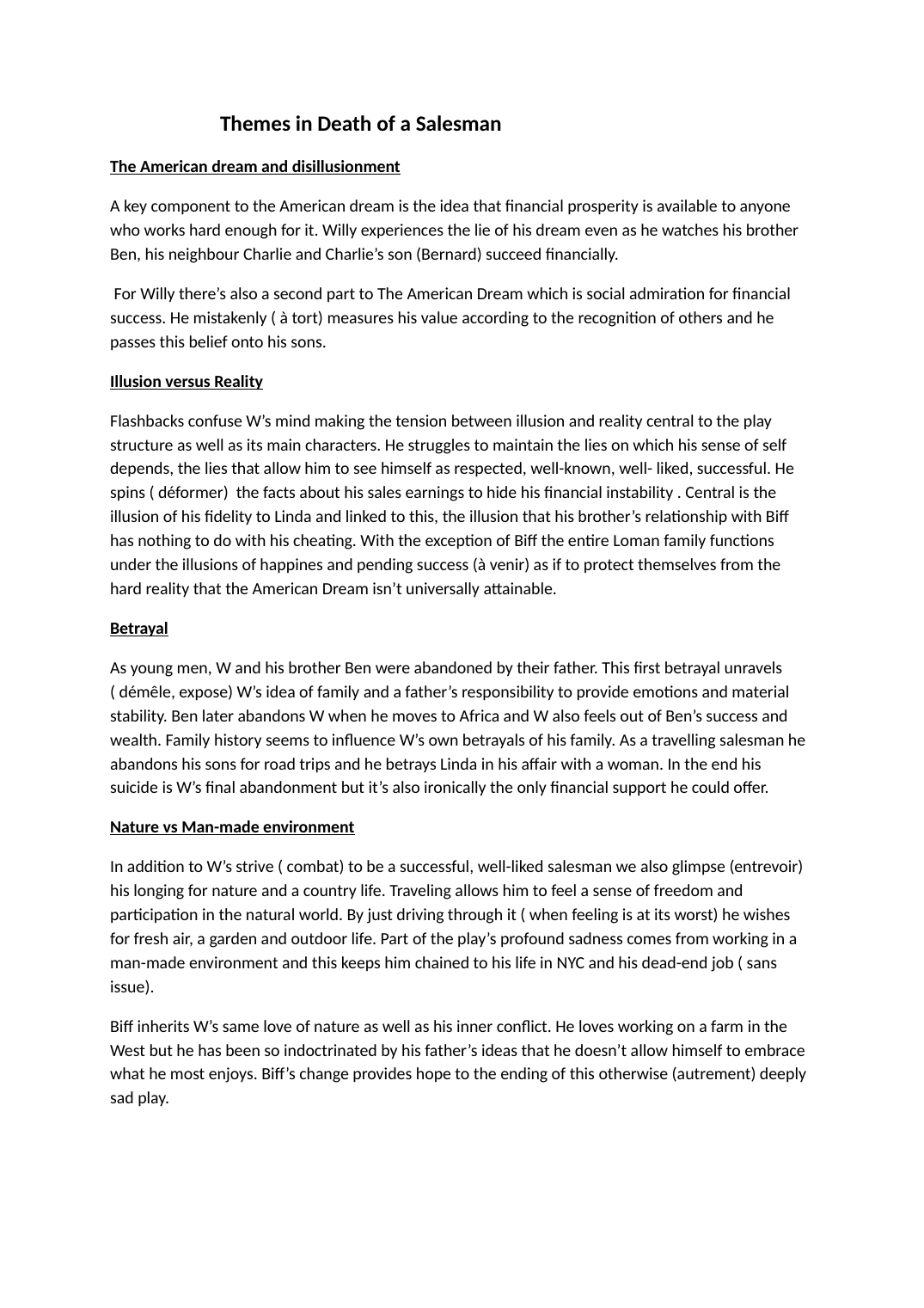Personnages death of a salesman
Publié le 05/03/2021
Extrait du document
«
Themes in Death of a Salesman
The American dream and disillusionment
A key component to the American dream is the idea that financial prosperity is available to anyone
who works hard enough for it.
Willy experiences the lie of his dream even as he watches his brother
Ben, his neighbour Charlie and Charlie’s son (Bernard) succeed financially.
For Willy there’s also a second part to The American Dream which is social admiration for financial
success.
He mistakenly ( à tort) measures his value according to the recognition of others and he
passes this belief onto his sons.
Illusion versus Reality
Flashbacks confuse W’s mind making the tension between illusion and reality central to the play
structure as well as its main characters.
He struggles to maintain the lies on which his sense of self
depends, the lies that allow him to see himself as respected, well-known, well- liked, successful.
He
spins ( déformer) the facts about his sales earnings to hide his financial instability .
Central is the
illusion of his fidelity to Linda and linked to this, the illusion that his brother’s relationship with Biff
has nothing to do with his cheating.
With the exception of Biff the entire Loman family functions
under the illusions of happines and pending success (à venir) as if to protect themselves from the
hard reality that the American Dream isn’t universally attainable.
Betrayal
As young men, W and his brother Ben were abandoned by their father.
This first betrayal unravels
( démêle, expose) W’s idea of family and a father’s responsibility to provide emotions and material
stability.
Ben later abandons W when he moves to Africa and W also feels out of Ben’s success and
wealth.
Family history seems to influence W’s own betrayals of his family.
As a travelling salesman he
abandons his sons for road trips and he betrays Linda in his affair with a woman.
In the end his
suicide is W’s final abandonment but it’s also ironically the only financial support he could offer.
Nature vs Man-made environment
In addition to W’s strive ( combat) to be a successful, well-liked salesman we also glimpse (entrevoir)
his longing for nature and a country life.
Traveling allows him to feel a sense of freedom and
participation in the natural world.
By just driving through it ( when feeling is at its worst) he wishes
for fresh air, a garden and outdoor life.
Part of the play’s profound sadness comes from working in a
man-made environment and this keeps him chained to his life in NYC and his dead-end job ( sans
issue).
Biff inherits W’s same love of nature as well as his inner conflict.
He loves working on a farm in the
West but he has been so indoctrinated by his father’s ideas that he doesn’t allow himself to embrace
what he most enjoys.
Biff ’s change provides hope to the ending of this otherwise (autrement) deeply
sad play..
»
↓↓↓ APERÇU DU DOCUMENT ↓↓↓
Liens utiles
- personnage death of a salesman
- En quoi cette scène d’aveu est-elle révélatrice du caractère héroïque des deux personnages ?
- dissertation juste la fin du monde: Comment la pièce Juste la fin du monde de Jean-Luc-Lagarce donne-t-elle à voir des personnages en crise ?
- Phèdre, Racine - Personnages décrits par des adjectifs
- le realisme des personnages dans L'exil d'Alboury

































